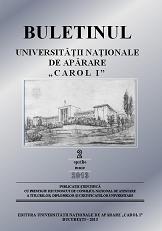NATO, EUROPA ŞI ÎNCHEIEREA RĂZBOIULUI RECE. PERSPECTIVĂ ISTORICĂ ŞI EVALUARE GEOPOLITICĂ
NATO, EUROPE AND THE END OF THE COLD WAR. HISTORICAL PERSPECTIVE AND GEOPOLITICAL ASSESSMENT
Author(s): Laurenţiu-Cristian DumitruSubject(s): Politics / Political Sciences
Published by: Carol I National Defence University Publishing House
Keywords: NATO; Warsaw Pact; German reunification; Strategic Concept
Summary/Abstract: The collapse of totalitarian regimes in the former communist countries during 1989, the German reunification achieved in October, 1990, the official dissolution of the Warsaw Pact, and the disappearance of the USSR in late 1991, marked the end of Cold War and the beginning of a new historical stage. In the new international political context, NATO continued to accomplish the role of collective defense, but it also became a co-operation organism with other organizations involved in guaranteeing security, as well as with the former adversaries. Military and political changes that occurred on the European continent at the end of the Cold War led not only to improving military strategy, by reducing the conventional forces in Europe and limiting the nuclear weapons to the lowest level, but also to reorganizing the Atlantic Alliance itself.
Journal: Buletinul Universităţii Naţionale de Apărare »Carol I«
- Issue Year: 2013
- Issue No: 02
- Page Range: 97-106
- Page Count: 10
- Language: Romanian

